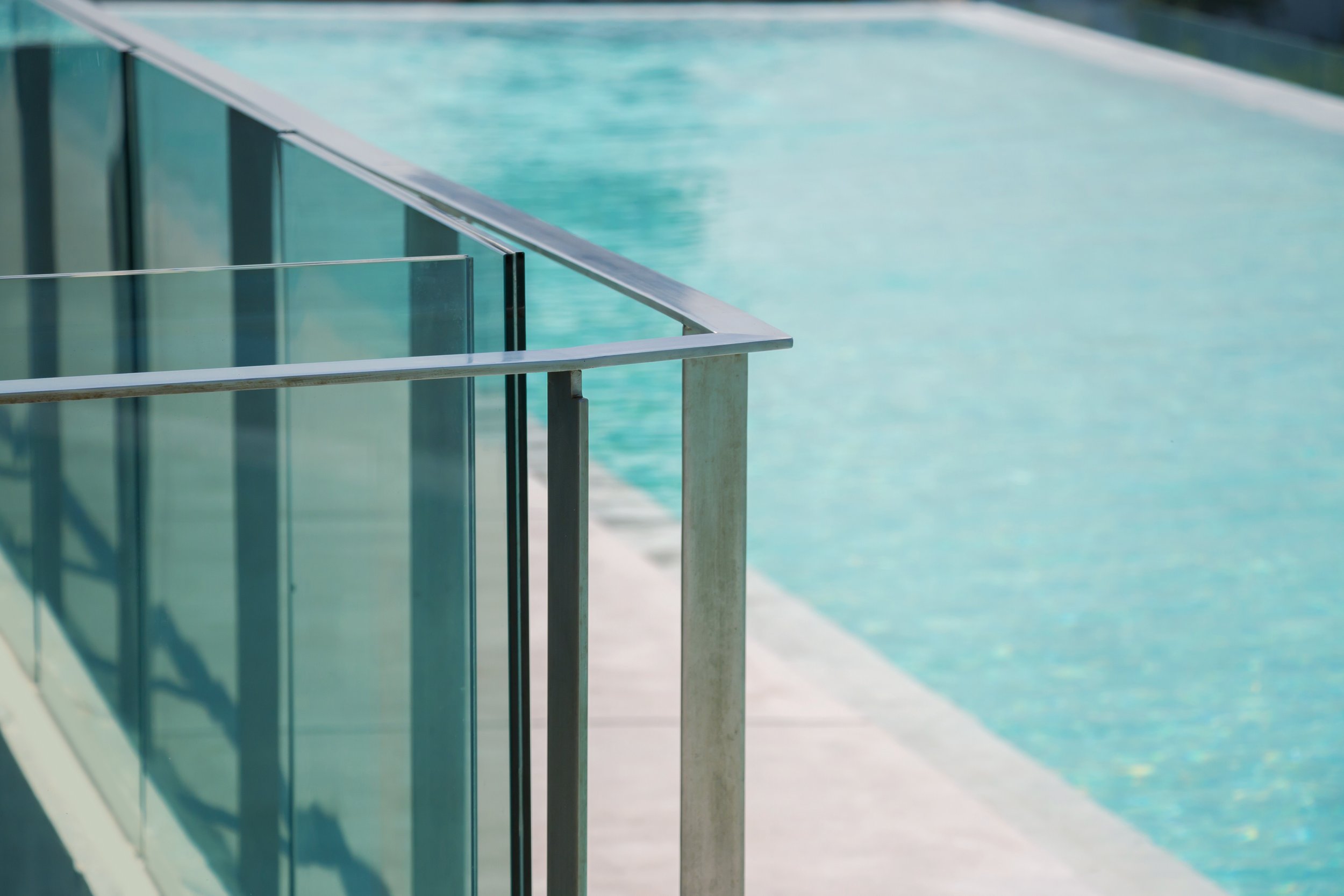Our top 4 pool fence materials
🛡️🏊♀️ Essentials for a Safe Non-Climbable barrier 🏊♂️🛡️
Aluminium Post Fence
At the simple end of the fence spectrum is the aluminium post fence. It’s sleek, classic, minimalistic, easy to maintain, and comes in a range of colours to suit the style of your house and garden. It’s one of the most affordable options in Australia, which is why they’re such a popular choice for Aussie homeowners.
It also meets Australia’s safety guidelines, so is perfectly safe for children and pets.
An alternative to the simple aluminium fence is combining it with brick or concrete pillars, as seen in the example above. This can look sleek, sophisticated, and beautifully grand, especially when the pillar’s material matches your home. As always, the aluminium fence comes in a range of styles and colours, so you can get the ideal look for your swimming pool.
Frameless glass pool panels
Another simple but elegant design is the glass panel fence. These can come framed, semi-framed, or frameless. As you can see from the picture above, the “invisible” frameless version is the most dramatic, providing unobstructed views of the surrounding garden and pool, and allowing you to keep a close eye on your young kids. Glass panels also do a great job of making your yard seem bigger, and when you combine them with pool lighting, the effect is gorgeous.
The biggest downside to glass panel fencing is the cost—they can be very expensive, depending on the type that you want. They also become dirty quickly (especially with kids and dogs around) so require regular cleaning to remain smudge-free and transparent.
Stone wall
A stone wall can seriously beautify the space around your pool while offering you full privacy. They complement other natural features as well, like plants and trees, and make great backdrops for pool fountains and waterfalls.
Expert tip! While a stone wall may look the part it still has to comply with regulations - it CANNOT have any protrusions or indentations greater than 10mm as they can act as a foot hold/hand hold and render your wall non compliant. It is important to get a qualified pool or spa barrier inspector even before you start works so that you are aware of the rules regarding barriers.
The one thing you may have trouble with is keeping it clean. The rough, porous surface will require a little extra work to keep the dust and dirt off.
Concrete wall
A solid concrete wall around your pool will offer tons of privacy and should last a lifetime. Many concrete walls are left bare, but there’s no need for that. You can paint it, tile it, or even cover it with a mosaic.
If that sounds like too much wall for you, you can break it up by integrating metal fencing or railing throughout.
Concrete block walls can be inexpensive, but you'll also need to leave room in your budget for paint, tile, or whatever you want to finish it with.
Mix and Match
Who says that you have to use one type of fence all around your pool? Feel free to mix it up so that you can get exactly what you want.
For example, if glass fencing is too expensive, you can use it to border the pool on the side facing your house for an unobstructed view and use a different type of fencing for the rest.
#PoolFenceEssentials #SecureYourPool #PoolAreaTips #CreatingPeaceOfMind #StylishYetSafe #PoolsideLiving #PoolSafetyMatters #LandscapingTips #OutdoorOasis #StaySecure #SwimmingPoolSafety #CreatingMemories #PoolSafety #SwimmingPoolRegulations #ChildSafety #SwimmingPoolCompliance #SafetyFirst #VictoriaSwimmingPools #SwimmingFun #PoolSafe #PoolSafeRegionalVictoria #KidSafe
Jimmy Rushton
Pool Safe Fence Inspections
poolsafevic.com.au
0493 362 410 jimmy@poolsafevic.com.au
CHRIS TYNDALL is a local fencing and earthworks contractor who we work with and who is paying attention to the new laws when working with their clients - you can contact Chris at TYNDALL FENCING http://www.tyndallfencing.com
Disclaimer: The information provided in the blog above is intended for general informational purposes only. It should not be considered as a substitute for a thorough Barrier Inspection or professional advice. While we strive to ensure the accuracy and completeness of the content, it may not cover all individual circumstances or specific requirements. . Always prioritise safety and seek expert advice to ensure compliance with relevant regulations and standards.

















